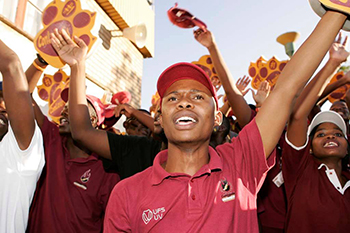
Residences of the University of the Free State showed off their colours and cheered their swimmers to victory at the first-year swimming gala on the Bloemfontein Campus.
Photo: Johan Roux |
The first-year students’ swimming gala is always a much-anticipated event, especially after the participants have rubbed shoulders with residence competitors at the first-year athletics. This year’s gala, which took place on 5 February 2016 at the Lindsay Saker swimming pool on the Bloemfontein Campus, proved as exhilarating as always.
The body painting competition, held through the University of the Free State Student Representative Council (SRC) portfolio of Media & Marketing, and sponsored by ABSA, was re-introduced.
Colleges in colour
Before the swimming, spectators had the opportunity to look at the body painting creations presented by each college. Colleges chose one of ten themes randomly. Nonetheless, true artistry was on display. South College were awarded the body painting floating trophy.
When asked about this year's competition, SRC Media & Marketing, Peo Segano, had this to say: "I questioned the relevance of it, but I got the opinion of the residence committees and how they felt about it.
“The majority voted for it to be re-introduced, and ABSA was more than happy to sponsor the paints and some treats.”
Soon after that, it was down to the business. The swimming started, and each residence was cheering ecstatically for their fellow freshmen as everyone waited in anticipation to see who would be crowned the kings or queens of the water.
Kings and queens of the water
Although many had sung their voices away, they continued to show their spirit through dance and movement. Then, residences were ready to hear whether it had all paid off. Armentum showed consistent effort in this regard, thus ensuring them of the spirit trophy.
To close off the festivities, the final announcements were made. Sonnedou was crowned the female residence winners, while Abraham Fischer (Vishuis) received the title of best male residence.